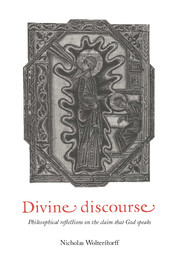Book contents
- Frontmatter
- Contents
- Preface
- 1 Locating our topic
- 2 Speaking is not revealing
- 3 The many modes of discourse
- 4 Divine discourse in the hands of theologians
- 5 What it is to speak
- 6 Could God have and acquire the rights and duties of a speaker?
- 7 Can God cause the events generative of discourse?
- 8 In defense of authorial-discourse interpretation: contra Ricoeur
- 9 In defense of authorial-discourse interpretation: contra Derrida
- 10 Performance interpretation
- 11 Interpreting the mediating human discourse: the first hermeneutic
- 12 Interpreting for the mediated divine discourse: the second hermeneutic
- 13 Has Scripture become a wax nose?
- 14 The illocutionary stance of biblical narrative
- 15 Are we entitled?
- 16 Historical and theological afterword
- Notes
- Index
12 - Interpreting for the mediated divine discourse: the second hermeneutic
Published online by Cambridge University Press: 01 June 2011
- Frontmatter
- Contents
- Preface
- 1 Locating our topic
- 2 Speaking is not revealing
- 3 The many modes of discourse
- 4 Divine discourse in the hands of theologians
- 5 What it is to speak
- 6 Could God have and acquire the rights and duties of a speaker?
- 7 Can God cause the events generative of discourse?
- 8 In defense of authorial-discourse interpretation: contra Ricoeur
- 9 In defense of authorial-discourse interpretation: contra Derrida
- 10 Performance interpretation
- 11 Interpreting the mediating human discourse: the first hermeneutic
- 12 Interpreting for the mediated divine discourse: the second hermeneutic
- 13 Has Scripture become a wax nose?
- 14 The illocutionary stance of biblical narrative
- 15 Are we entitled?
- 16 Historical and theological afterword
- Notes
- Index
Summary
Suppose one has discerned the human authorial discourse of the biblical writings. How does one then move on, as the traditional practice assumes one must, to discern the mediated divine discourse? And let me say, once more, that to understand how the Bible as a whole, with its extraordinary diversity of texts, could be an instrument of God's discourse, I am working with the appropriation model; different models would yield a somewhat different answer to our question.
It would, in my judgment, be a mistake to move on too quickly. Perhaps even those who read while running can get something out of Plato's Republic, and Dante's Divine Comedy. But the experience down through the ages of those who participate in Western culture is that these works repay repeated and close reading; subtleties and profundities never noticed when we read as we run come to light when we meditate on these works. Surely we must suppose the same for God's book; we must suppose that God's book requires and rewards close attention to what its human authors wrote. For it is by way of that, that God discourses. The truly dazzling contributions which critics have made in recent years to our understanding of biblical narrative and poetry have mainly come from those who disavowed any explicit theological concerns. Their contributions are nonetheless of inestimable worth for those who do read for theological concerns – more specifically, for those who read to discern the speech of God.
- Type
- Chapter
- Information
- Divine DiscoursePhilosophical Reflections on the Claim that God Speaks, pp. 202 - 222Publisher: Cambridge University PressPrint publication year: 1995



